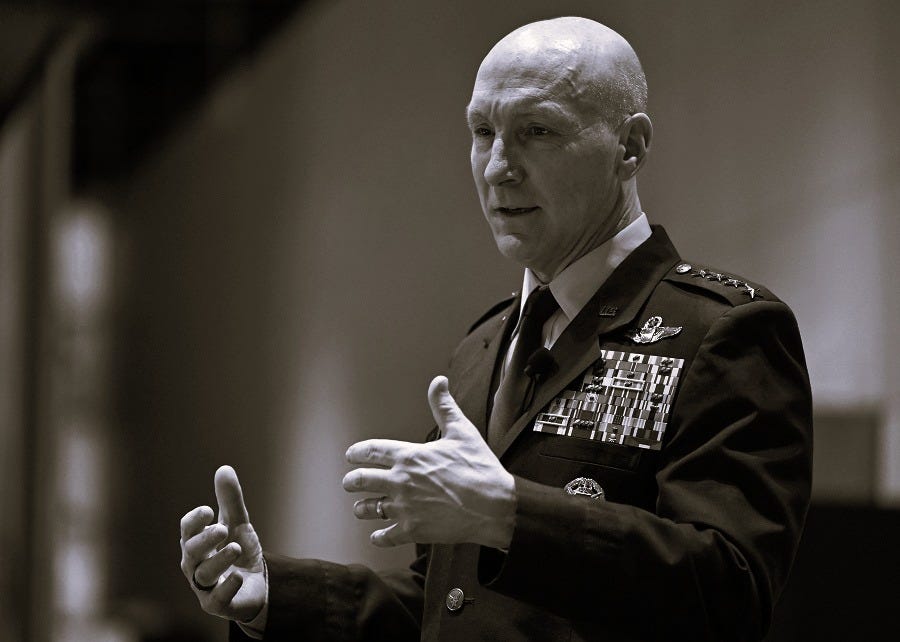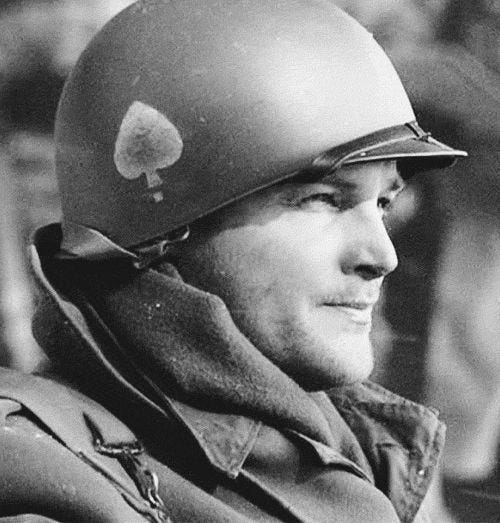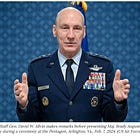Foxhole Norman
An Air Force under siege and an absentee leader perfectly suited to the moment
The legendary TV masterpiece Band of Brothers tells the story of Easy Company, a unit within the 506th Parachute Infantry Regiment which wrote itself into history with countless feats of arms as the Second World War reached its bloody European crescendo.
A prominent theme in the story of Easy is how the company served as a training domain and stepping stone for a series of commanders, some exceptionally competent and others less so. Off the bottom of the register, we find Lt. Norman Dike, who commanded Easy during the Battle of the Bulge and was pejoratively known by his own soldiers as “Foxhole Norman.”
They gave him the moniker because he was never visible, involved, or even available in the tough moments.
Dike got his crack at company command by being a favorite of someone powerful. But he was a poor soldier and a poor leader, frequently disappearing into the forest under the guise of important meetings. He made no connection with his people. He built no relationships. When the chips were down, they knew he did not have their backs.
In the TV version, Dike is killed in action during the Battle of Foy, which his soldiers regard as a small mercy. In real life, Dike was relieved for incompetence during the battle, having gotten several of his men killed with hesitation and poor decisions.
But he survived, was soon promoted, became aide to a divisional commander, and went on to a successful Army career. After the Army, Dike graduated from Yale Law School, another opportunity afforded by his blue-blood connections, and enriched himself as officer of a corporation contracted to mine uranium for the US government.
In fantasy world, bad leaders pay a price.
In the real world, the price is paid by their people while bad leaders keep going.
I wrote recently that the US Air Force needs different generals. The formula by which we’ve been developing and promoting officers is failing us. It’s putting play-it-safe politicians into roles where stalwart, courageous leadership is needed now more than ever.
You can read the full piece below.
But let’s zoom in on one particular excerpt.
When I return to this clutch of words now, reflecting on what has occurred in the months since I wrote it, I arrive at the conclusion that there could not be a more perfect fit for the role of Chief of Staff at this moment in time than Gen. Dave Allvin.
That’s not a compliment.
The Air Force is currently a winged dumpster fire. Oldest fleet ever. Smallest fleet ever. Fewest people ever. Lowest mission capable rates since we started keeping track. If the big balloon went up tomorrow, only 6 in 10 of the service’s aircraft would be fit to fly.
The operational anemia traces to institutional fatigue, which in turn traces to normalized understaffing, under-training, and overstretch. The service has been on war footing since Desert Shield, cutting away nearly half of its force structure since, amid ceaseless growth in demand for air and space power. Huge manpower cuts in ‘07 and ‘14, framed as difficult budget choices enabling modernization of the fleet, broke the service’s spine.
Combined with a discernible rise in the per capita incidence of shitty leaders, the pressures of war and budget triggered a crisis of morale and retention. The service is now more than 2,000 pilots short of requirements. They are flying a fraction of the training hours they need to stay sharp, and for the first time ever, training less than pilots in adversary air services.
The maintenance community is burned out, perpetually short-handed from decades of “more with less,” which is an impossibility of reason and a statement of organizational self-delusion all at once.
In the context of an institutional crisis which looks worse than the “hollow force” nightmare of the ‘70s, there are two possible responses we might expect from senior figures.
Abject, fury-fueled, amygdala-driven cackling while stomping on the desks of legislators, executives, political appointees, media contacts, Avon Ladies, and anyone else willing to listen to the shrill warning that the thickness of our national defense is somewhere between saran wrap and doily, and getting thinner. This is the response expected if senior officials are what we might call vertebrates, or perhaps even leaders, and therefore committed to maximum use of rank, access, position, influence, voice, and profile to achieve the maximum stewardship of the service.
Anything less. Which is what we would expect from inveterate bureaucrats who are just happy to be in their jobs, keen to be seen as loyal and obedient, and disinterested in the hassle of leadership.
Taking his cues from Foxhole Norman, Allvin is operating squarely within (2).
Given that presidential administrations are mainly interested in how to use the military services as a servile political football, and given that Congress is mainly interested in how to use the military services as a pry bar to separate Americans from their wallets, Allvin’s actions make him an ideal fit.
Before I go any further, let me raise the pH a little by disclaiming two things.
First, Dave Allvin is not the author of the Air Force’s situation. The crisis is entrenched, and started long ago.
At several critical moments, Allvin’s predecessors chose to trade away people to fund the modernization of equipment. They did so without a plan to reduce tempo or ring-fence the resources to train and develop airmen.
They didn’t successfully land the argument that funding levels were too low given the expense of aerospace technology and the level of Air Force budget dedicated to supporting the activities of other services. Most never attempted the argument, despite how evidence clearly shows generational under-funding of the Air Force in an apples-to-apples comparison.
None attempted a reform of acquisition or a strategy less invested in each new wave of stealth. Such arguments have no political or industrial sponsorship, and thus would have required a Chief of Staff with courage, credibility, and the political connections to run a military-industrial gauntlet.
So I concede Allvin is just the next in a long line of caretaker Chiefs, though a few managed to at least model strong leadership while maintaining their swim lane.
Second, I don’t pretend Allvin has command authority. He’s a staff officer. Primarily a bureaucrat and budgeteer by definition. But like it or not, he’s also our nation’s highest ranking airman. His words and actions carry a lot of weight. He sets the tone for the Air Force, and through what he chooses to prioritize, sets a cultural direction as well. He also dictates policy, and by flexing his authority to do so, makes himself subject to assessment in the leadership dimension.
While I concede Air Force Chiefs of Staff don’t have the galactic authority to change major outcomes, you might know from recent articles here and here that I also don’t subscribe to the idea that senior officers are parasol-wielding daisies voiceless in the issues that determine service direction.
Indeed, generals have more capacity to influence and challenge than is commonly appreciated. In the years of politically saturated twin counterinsurgencies, they’ve normalized the deviation of passivity.
If not them to lead, then who?
When they don’t lead, no one does. When they cede their authority, it gets claimed by politicians. When they pretend to be powerless, it becomes self-fulfilling. When they sit silent and accept a conclusion, they adopt it on behalf of the entire service. And when we look back at the past 30 years, there are precious few Air Force generals walking with a limp for taking challenges too far in advocating for the people they’re entrusted to support.
That’s contrary to previous tradition. And it’s a recipe to get our asses kicked.
Still, I can anticipate an argument that none of this means Allvin, a good man, should be caricatured as Foxhole Norman.
So let me explain what I think makes him different.
Conventional wisdom tells us that great leaders emerge in times of crisis. The right individual, subjected to the pressures of a great trial, seizes the opportunity to demonstrate great character and change the world.
I like this formulation. It has a romantic quality that makes it irresistible. And we can find many examples that make it true, from Churchill to Lincoln to Eisenhower.
But there’s a flip side. Because for every great leader who wins, there’s a loser on the other side who didn’t emerge. Who didn’t rise to the moment. Who didn’t have what it took.
With John Sculley as CEO, Apple invented nothing, lost market share and investment, and ran out of ideas. With Steve Jobs back in the seat, Apple innovated the iMac, the iPod, and invented the digital music marketplace which all but replaced physical media in less than twenty years.
Sculley shrunk from his moment. Jobs rose to his.
Norman Dike was a soldier who hated conflict. When the pressure came on, he shrunk from the moment.
Gen. Allvin lives and works in a time of great trial. Lets review the recent pressures exerted on the Air Force, and judge whether he is rising to his moment.
Gen. Allvin’s predecessor, former boss, and colleague on the joint chiefs was fired. No public reaction noted from Allvin.
Gen. Allvin’s Vice Chief was also fired. Again, no reaction.
Lt. Gen. Jennifer Short, senior military aide to the Secretary of Defense, was also fired. Short had been pushed for her role by Allvin, or at the very least with his support. She was in the role just 144 days, the shortest in modern history absent misconduct. Clearly, Allvin wanted her to have the job. But when she was fired for political convenience, there’s no evidence he attempted to place her into another job and keep her career going. Short is retiring. Nothing heard from Allvin.
Col. Ben Jonsson was nominated for his first star but had his nomination held up due to an Op-Ed he wrote five years ago discussing racial disparity. Last summer, Allvin supported Jonsson’s nomination being extended another year, clearly hoping a change in political tides might result in his confirmation. But as Jonsson’s career has finally frozen to death, we’ve heard nothing from Allvin.
The stories of airmen and their exploits are getting scrubbed from the books based on keyword searches that wrongly associate important moments of courage and lethality in airpower history with DEI policies. Where is Allvin in all of this? Why are we not hearing push-back from someone who has a duty to proactively exercise integrity and speak truth in such moments?
Allvin’s own plan to reorganize the service and adjust its deployment cadence has been halted by the Secretary of Defense. Not a word.
Allvin’s legal advisor has been fired. Now I know mistreatment of lawyers is a generally humorous prospect, but Allvin neither smiled nor cried.
When all this can happen and the service’s chief is nowhere to be seen, then we have reason to suspect he is irrelevant.
Either he doesn’t care or is otherwise unable or unwilling to engage. Either way, he’s making his position an expensive but superfluous ornament. Much like the Air Force will be absent strong leadership.
It’s hard times for the Air Force. It’s in a fight for survival. Getting shelled from all directions. Looking for some idea of how to rally and regain the initiative.
And in this moment, their Chief of Staff is silent and invisible save for an occasional reminder about uniforms and a propaganda lap in the Oval Office.
Tell me how that’s not analogous to the ballad of Foxhole Norman.
It’s time we go back to first principles.
Either something is important or it isn’t. If it’s important, then we should see clear evidence that people entrusted to care about it are willing to take actions and speak words and set examples to influence or move it.
If not, then I well and truly have no idea what the hell any of us are doing here.
Gen. Dave Allvin is the Chief of Staff of the Air Force. He’s impersonating The Man Who Wasn’t There. He’s losing what little trust and confidence remains among the rank and file by showing airmen he does not and will not have their backs.
Some will say “yeah, but he’s a good guy.” That’s not the point. Norman Dike was a good guy too.
Allvin can be a good guy, a family man, an honorable man, a moral man. And yet, he can fail to have the stones and the guile and the resolve to represent and to lead this nation’s Air Force. He can lack the poise and resourcefulness and literacy to help the public understand what airpower is, why it’s important to them, why it’s broken, and what it will take to fix it.
Absurdity becomes normal when credible people normalize it.
I’m still in just enough denial that I can believe absurdity can’t be normal. So it must be that some people purporting to be credible aren’t.
I don’t find Gen. Allvin credible as a Chief of Staff. And I reckon if his civilian counterpart wasn’t busy bombarding airmen with memos that suppress their freedom to say so aloud, we might be hearing the same from many of them.
They’re wondering who is looking out for them in this moment.
Foxhole Norman was a bad leader who struggled at being miscast. He found a way to survive, but his ineptitude meant a lot of other people didn’t.
Dave Allvin is playing with much bigger stakes, up to and including the continuation of the American way of life. Let’s hope I’m wrong and he’s employing personal stealth to fool us.
Because if I didn’t know better, I’d think we have a Chief of Staff wandering around smoking a pack of lucky strikes while the whole circus is burning to the ground.
Tony Carr is retired Air Force officer and former squadron commander. He writes independently on national defense matters and other stuff.










Ooof. I’m not sure I can disagree here except to say he’s not the only four or three star across the DoD like this.
The Fronde shall arrive from an unexpected direction flying on the wings of unmet expectations…
…’Tis predictable… now predicted..